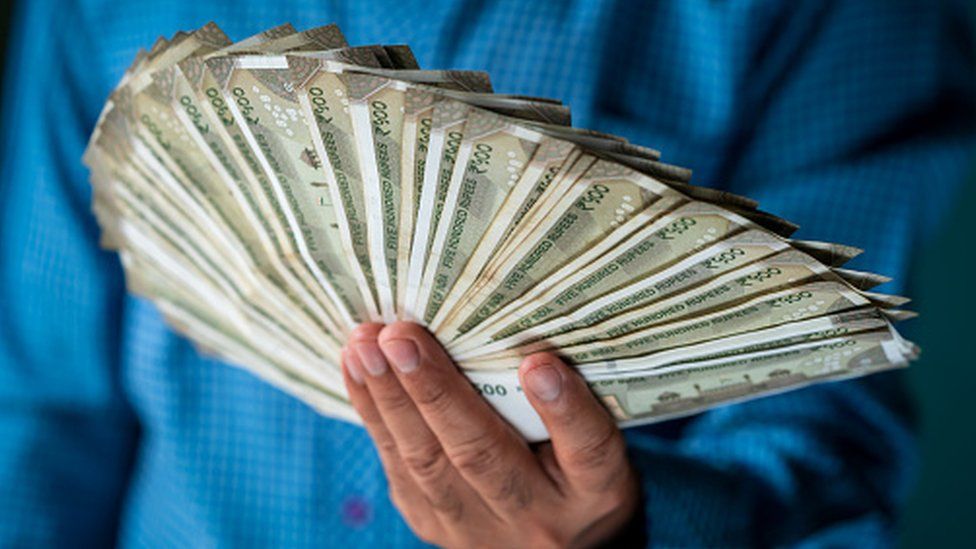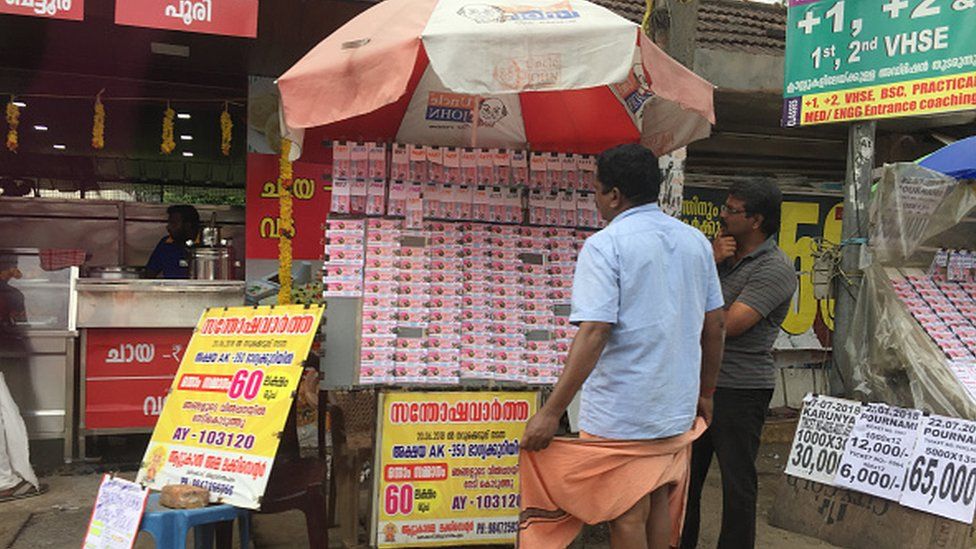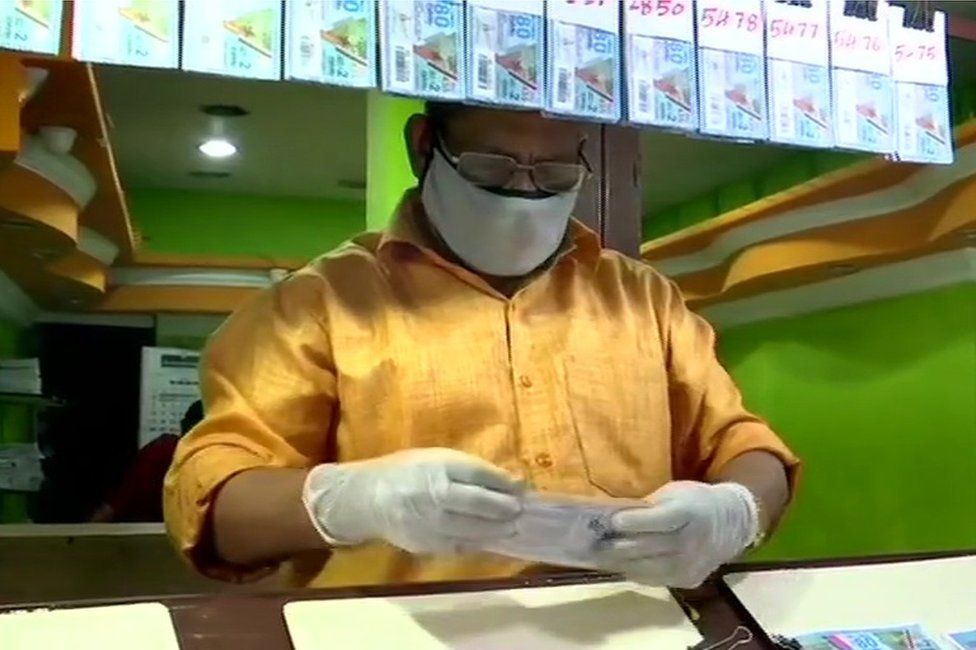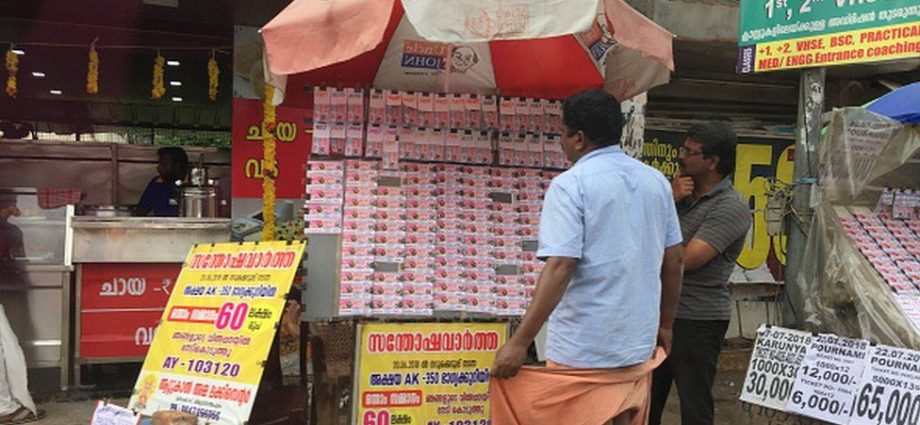
“I just went to a shop to buy a bag for my son and they wouldn’t return my change, assuming I didn’t need the money.”
This isn’t the first time that Anoop B, from the southern Indian state of Kerala, has faced such a situation.
Two months after hitting the jackpot in a government lottery, the 32-year-old says that his life has changed in ways he couldn’t imagine.
He can’t step out of his house without being recognised, many friends and relatives are upset with him, and almost everyone he meets asks for money.
“Many people who were once close have stopped talking to us now,” he says.
Anoop made national headlines in September after he won a whopping 250m rupees ($3.01m, £2.7m) – the highest ever offered in the state for a lottery. The lottery is illegal in many Indian states but a few, including Kerala, allow it with strict regulations.
But a few days later, Anoop went viral again – this time for a video in which he asked people to stop harassing him and his family for money. At the time, he said he wished he hadn’t won the jackpot.
When the BBC contacted Anoop this week, he was reluctant to speak at first. He also requested that his photo not be published as “every new article brings another wave of attention”.
“I think you can only understand what it’s like if you’ve been through this,” he says over the phone. “It’s like a scene from a movie. Suddenly, everyone you know is at your house.”
The chef-turned-tuk-tuk driver from Thiruvananthapuram district had been buying lottery tickets for over a decade, and had even won small amounts earlier.
But the jackpot changed his life in ways with which he is still struggling to come to terms.
“People’s attitude towards you changes overnight,” he says.
In the weeks after the announcement, his house and neighbourhood were overrun with hundreds of people who wanted help.
“We would wake up to find a crowd outside. It would start from 5am and they’d stay there till late in the night,” he recalls.
Anoop’s wife, Maya, had told a local news channel that the couple had discussed the possibility of helping people once they received the money.
“People picked up on the offhand mention of help and ran with it,” she says.
Requests for money poured in from across the state. Some asked for help paying off their mortgage or loans, while others requested assistance with their daughters’ wedding expenses.
“There were so many calls from banks and insurance agents,” he says. “A group came to me from Chennai asking for help funding a film.”
Apart from genuine requests, the couple also dealt with people who felt they had a claim to the money.
“One man sat in our house all day demanding that I buy him a Royal Enfield motorbike,” Anoop says.
“Everyone thinks I got this money for free, by doing nothing, and so they ask why I can’t just give them some,” he says.

Online rumours also affected their peace, the couple says.
“There were social media posts saying that I was lying about winning, that I already had a lot of money and that my win was fraudulent,” he says.
Anoop says he is still wary of going out in public.
“People recognise me wherever I go because my face was on so many news channels, websites and newspapers.”
He’s also worried about the safety of his wife – now eight months pregnant – and toddler son.
But one thing that gave him solace was knowing his experience was not unique.
In October, while appearing on a game show on a local TV channel, Anoop met Jayapalan, 59, who had won the same jackpot last year.
Jayapalan, who won 120m rupees, had experienced a similar flurry of media attention and requests for financial assistance.
“It became hard to tell who actually needed help and who just wanted money,” he said on the show.
“Friends become enemies,” Jayapalan, who still drives a tuk-tuk, added. “Many are still upset that I didn’t give them money.”

He had to file police complaints after receiving some threatening letters, and has installed CCTV cameras around his house.
His advice to Anoop was to be very careful with the money.
“People think winning the lottery wipes out all my concerns about money. But everything is still uncertain. I don’t know how much I’ll be left with after taxes,” Anoop says.
The calculations around how much prize money the winner receives is “complicated”, both the winners said on the show.
Apart from a 30% tax cut by the state government at the time of handing over the winnings and the commission deducted by the ticket agent, the winner must also pay a cess and surcharge to the federal government.
After the ruckus created by Anoop’s win, the state government organised a day’s training programme on financial management to help him use the money well.
He now plans to wait a few years before deciding what to do with his winnings.
“There’s no doubt that the money is a blessing,” he says.
“But before I do anything or help anyone else, I need to manage it well to make sure that my family is taken care of and their future is secure.”


